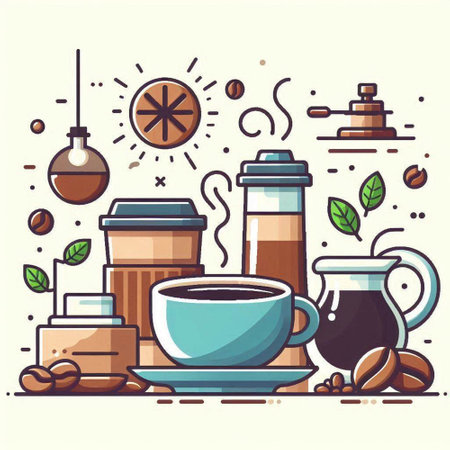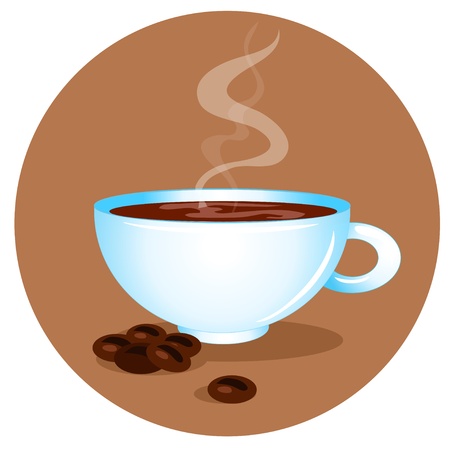1. Introduction: The British Brew Dilemma
When it comes to defining British culture, few debates are as enduring or as passionately discussed as the one between coffee and tea. Both beverages have deep historical roots in the UK, shaping social rituals, slang, and even stereotypes that persist to this day. Tea, with its storied legacy dating back to colonial trade routes and elegant afternoon teas, has long been seen as the quintessential British drink. Yet coffee, once an exotic newcomer served in lively 17th-century coffeehouses, has steadily gained ground, particularly among younger generations and urban dwellers. This ongoing rivalry is more than just a matter of taste; it reflects shifting identities, evolving lifestyles, and a rich tapestry of traditions that continue to influence how Britons see themselves—and each other—over a steaming cup.
2. Slang Unfiltered: Talking About Your Cuppa
If there’s one thing that sets the British apart, it’s the way we talk about our beloved brews. The humble cup of tea—or “cuppa” as it’s affectionately known—has spawned a rich tapestry of slang expressions, each woven into the fabric of daily conversation. Coffee, too, has its own share of colloquial flair, though often with a cosmopolitan twist. Whether you’re popping ‘round for a “brew” or grabbing a “flat white,” these terms do more than describe a drink—they reveal layers of British identity and social ritual.
Tea Talk: Classic Phrases
| Slang Term | Meaning | Context |
|---|---|---|
| Cuppa | A cup of tea (sometimes coffee) | “Fancy a cuppa?” is an everyday invitation |
| Brew | Usually refers to tea in the North; sometimes coffee elsewhere | “Put the kettle on for a brew” signals it’s time to pause and chat |
| Builder’s tea | Strong black tea with milk, no frills | Served at work sites or when you need a ‘proper’ pick-me-up |
| Rosie Lee | Rhyming slang for tea | “Let’s have a Rosie Lee” among Cockney speakers |
| Char | An old-fashioned word for tea (from Hindi/Chinese origins) | Used nostalgically or by older generations: “A nice cup of char” |
Coffee Lingo: Modern Brews & Urban Cool
| Slang Term | Meaning | Context |
|---|---|---|
| Flat white | Smooth espresso with steamed milk—Aussie import, now mainstream UK café culture | “I’ll have a flat white, cheers” in trendy London cafés |
| Caff/Greasy spoon | No-frills café serving strong instant coffee and fry-ups | “Let’s pop to the caff for a quick one” is pure working-class ritual |
| Americano/Long black | Espresso diluted with hot water—basic but bold | A go-to order for those who want their coffee straight up |
The Social Ritual: More Than Just Words
Saying “fancy a cuppa?” isn’t just about caffeine—it’s shorthand for comfort, connection, and cultural belonging. Tea slang tends to evoke warmth and nostalgia, anchoring conversations at home or in the workplace. Coffee lingo, meanwhile, can signal urbanity or modern taste—a flat white hints at weekend brunches in Shoreditch or student meet-ups in Manchester. Both worlds overlap in daily chat, giving Brits countless ways to express mood, class, or even regional pride through their choice of words as much as their chosen drink.

3. Tea: Quintessential Britishness?
If you want to glimpse the soul of Britain, look no further than its teacups. Tea is more than a beverage here; it’s practically a cultural institution—an emblem of comfort, tradition, and togetherness. The phrase “a nice cuppa” resonates deeply in the national psyche, evoking memories of family gatherings, rainy afternoons, and the gentle clink of china. For many Brits, tea is woven into daily rituals, whether it’s the first brew at dawn or the classic 4pm afternoon tea—complete with scones, clotted cream, and jam.
This ritual isn’t just about taste; it’s nostalgia in a cup. Afternoon tea dates back to Victorian times, immortalised by the upper classes but now enjoyed everywhere from posh hotels to humble kitchens. It’s about slowing down, indulging in a spot of cake, and having a natter with friends. The humble teapot becomes a symbol of hospitality and home, reinforcing the British reputation for politeness and social grace.
Tea’s status as a national icon goes beyond stereotypes. In times of crisis—be it family drama or national emergencies—the British response is often “Put the kettle on.” This simple act signals reassurance and solidarity. Whether brewed strong with ‘builders’ tea’ slang or delicately steeped for afternoon elegance, tea encapsulates both resilience and refinement. For visitors and locals alike, to sip tea in Britain is to partake in a living tradition that continues to shape British identity today.
4. Coffee Culture: The Continental Influence
Once upon a time, British café culture was defined almost exclusively by the humble cup of tea and the ritual of afternoon tea. But over recent decades, coffee has surged onto the scene, riding a wave of continental sophistication straight from the boulevards of Paris and Milan. The rise of the espresso machine and flat white has brought with it an entirely new attitude—one that is cosmopolitan, fast-paced, and deeply social.
Today’s British high streets are dotted with independent coffee shops and global chains alike, each vying for attention with creative brews and a touch of European flair. This shift hasn’t just altered what we drink; it’s fundamentally changed how we interact. The traditional “cuppa” in the kitchen has given way to catch-ups over cappuccinos, business meetings over lattes, and solitary moments of urban people-watching with a strong Americano in hand.
Coffee Shops vs Tea Rooms: A Changing Landscape
| Coffee Shop | Tea Room | |
|---|---|---|
| Atmosphere | Buzzy, modern, urban | Quaint, relaxed, traditional |
| Beverage Focus | Espressos, lattes, flat whites | Loose-leaf teas, scones, clotted cream |
| Clientele | Younger crowd, professionals, students | Older generations, families, tourists |
| Cultural Vibe | Continental chic meets British banter | Classic British nostalgia |
The Cosmopolitan Appeal of Coffee
The appeal of coffee isn’t just about caffeine—it’s about identity. Ordering a cortado or nitro cold brew signals a certain worldliness; knowing your macchiato from your mocha is now a badge of urban sophistication. As British cities embrace these continental habits, language follows suit: baristas toss around Italianate terms with ease and customers debate the merits of single-origin beans versus blends.
Changing Rituals and Social Spaces
This evolving café culture is reshaping British identity in subtle ways. The local café has become a third space—neither home nor work—where friendships are forged and ideas exchanged. It’s here that you’ll overhear slang-rich conversations (“fancy a flatty?”) blending seamlessly with continental cool. In this new era, coffee isn’t just a drink; it’s a lifestyle statement—a symbol of Britain’s ongoing love affair with reinvention.
5. Stereotypes, Rituals, and Realities
When it comes to British identity, few things spark as much playful banter or gentle ribbing as the supposed divide between tea and coffee drinkers. The stereotype is well-worn: tea drinkers are imagined as genteel, reserved, and steeped in tradition—think porcelain cups, doilies, and the Queen’s garden parties. Coffee enthusiasts, by contrast, are pegged as trendy urbanites, huddled over flat whites in hipster cafés or dashing into Pret on the way to an early-morning meeting. But how accurate are these clichés, and what do they really say about contemporary Britain?
The Tea Drinker: A National Icon?
While it’s true that a “nice cuppa” holds near-sacred status in the British psyche, the image of the tea-drinking Brit with their pinky raised is more sitcom than street scene. Brits of all ages and backgrounds reach for tea not just for tradition’s sake but out of comfort—a shared ritual that bridges class and region. Builders brew strong mugs at construction sites; university students cling to teabags during revision marathons. Far from being dainty or old-fashioned, tea drinking can be robustly practical—just ask anyone who’s faced a power cut or a rainy Tuesday afternoon.
Coffee Culture: More Than a Modern Fad
Coffee houses have actually been part of British life since the 17th century (long before flat whites were Instagrammed). Today’s independent roasteries and chains alike reflect a cosmopolitan energy thriving in cities like London, Manchester, and Edinburgh. The stereotype of the coffee snob—debating single origin beans and latte art—isn’t without truth, but most Brits still see coffee as fuel for busy lives rather than a statement of sophistication. Yet even here, rituals abound: ordering your “usual,” sharing gossip over cappuccinos, or escaping the drizzle inside a bustling café.
Debunking the Divide
The reality is far messier—and more interesting—than stereotypes suggest. Many people happily switch between coffee and tea depending on mood, time of day, or social setting. Office culture might demand a morning espresso shot, while family gatherings practically require a round of teas. Regional quirks add flavour: Yorkshire folk might swear by their brew’s strength, while Londoners discuss which independent café serves the best pour-over. These choices reflect personal taste as much as cultural heritage.
The Bottom Line
Ultimately, both drinks serve as social glue in Britain—ways to welcome friends, break awkward silences, or simply pause amid the bustle. Whether you’re partial to builder’s tea or a cortado with oat milk, what matters most is the sense of connection each cup brings. In debunking these playful stereotypes, we find that British identity is less about picking sides and more about celebrating everyday rituals—one steaming mug at a time.
6. A Nation of Choice: Coffee, Tea, or Both?
In today’s Britain, the debate between coffee and tea is no longer a simple matter of tradition versus trend. Walk through any high street in London, Manchester, or Edinburgh, and you’ll find bustling cafés offering single-origin espressos right next door to centuries-old tea rooms serving up a classic builder’s brew. The nation has evolved into a place where both beverages are not only accepted but celebrated—a testament to the UK’s increasingly diverse and cosmopolitan identity.
The Modern British Identity
Once defined by its love of tea, modern Britain now embraces both coffee and tea as part of everyday life. It’s not uncommon for someone to start their morning with a strong flat white and wind down with an Earl Grey by late afternoon. This duality reflects a broader cultural shift: British identity is less about rigid traditions and more about personal choice and global influences. The drink in your mug says less about your class or region these days and more about your individuality—and perhaps your mood that morning.
Coffee and Tea as Social Signifiers
While stereotypes linger—coffee for the young urbanite, tea for the nostalgic traditionalist—the reality is more nuanced. Coffee culture brings with it a touch of continental flair, an air of fast-paced city life, while tea still evokes comfort and connection, often shared over a good natter. Yet, neither beverage fully defines who we are; instead, they provide a rich palette for self-expression within the British context.
What Our Preferences Say About Us
Choosing coffee or tea can be playful shorthand in social settings—think office banter over who needs their “cuppa” versus who craves their “latte fix.” But ultimately, whether you’re partial to a steaming mug of Yorkshire Tea or a velvety cappuccino, what matters most is the freedom to choose. The coexistence of both drinks mirrors Britain’s evolving openness—a nation comfortable in its heritage yet eager to explore new tastes.
As we reflect on this blend of old and new, perhaps our beverage preferences reveal not just our habits but our adaptability. In a land where slang changes as quickly as café menus and stereotypes are gently poked fun at, being British today means enjoying the best of both worlds—one sip at a time.


